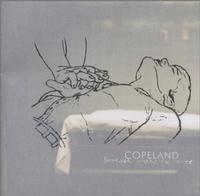
Copeland
Beneath Medicine Tree (2003)
jonathan
I must admit that I feel slightly awkward trying to form a critical view of Copeland's debut album Beneath Medicine Tree. Having left their home scene of Florida after signing with The Militia Group record label, the band is a recent migrant to Atlanta. Front man Aaron Mesh openly reveals that this album was shaped by two recent tragedies in his life–the hospitalization of his girlfriend as she struggled with lupus, and the death of his grandmother. Thus, the entire album is encrusted with this very medical theme. There is a strikingly beautiful insert included, more of a photo book than just liner notes, with imagery shot in Tampa's General Hospital by the band's bassist James Likeness. (For those interested, more of Likeness's photography can be found here). So now I am faced with the task of reviewing what is essentially a diary entry from Mesh, a musical documentation of what was understandably a very trying time in his life.
Copeland's sound is something akin to the usual fare of soft emo–imagine some kind of amalgamation of Dashboard Confessional, Ben Folds, and The Weakerthans. I must note that while I certainly went through my emo phase during my high school days, I have mostly moved away from the genre, save for a few nasty breakups when this type of fare often provided some sort of solace. Mostly, I think the problem with much of this emotionally charged music is that it always walks a fine line between clichéd, ridiculous sentimentality and actual honesty. I can accept this soft emotive music when I feel it is real and honest. And maybe I'm basing it just on some liner notes, but I find myself believing Copeland.
Sadly, the music on Beneath Medicine Tree is no revelation. Fans of Dashboard Confessional and The Weakerthans' latest offerings will surely find something to like here. Copeland is doing some very similar things, but there are musical enhancements along the way–some unique guitar patterns, even some organ work. But every track is a slow or mid-tempo ballad, and several times while listening to this album, it sounds and feels like a more electric version of Chris Carrabba's style in Dashboard Confessional. It's a shame, because obviously Copeland's vocalist and songwriter Aaron Mesh has something personal to write about, not just mindless generic love songs. The sound here is just so reminiscent of previous offerings in the genre that it just feels like rehash at times.
There are some standouts, notably "California," where acoustic guitar and a driving keyboard (possibly even organ) line push towards a majestic electric finish, "Brightest," a flowing piano ballad with touches of guitar for texture, and "When Finally Set Free," a musically diverse closing track.
But when Mesh is writing lyrics like, "Soon enough my strength will return/Let me draw the blinds for you/You can watch the sunset from the bed in your hospital room," it makes my job enormously more difficult. Again, it comes to a matter of belief. In terms of emotion and a well-themed, complete album, Beneath Medicine Tree works. In terms of offering us anything with this emotion that could have been musically unique, it falls short.